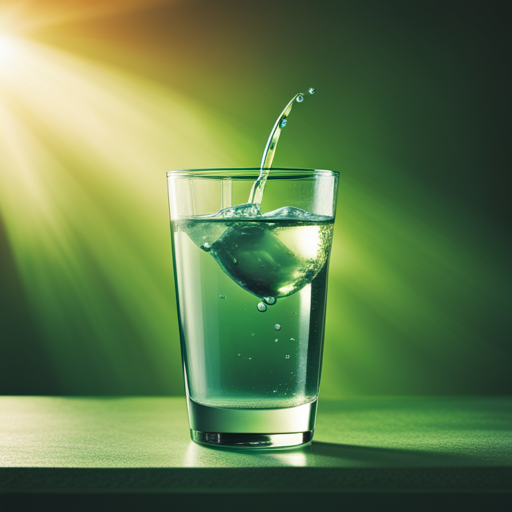Are you confident that your fridge filter is protecting you from harmful bacteria like E. coli? While most people rely on their refrigerator filters to improve the quality of their drinking water, many are unaware that these filters may not be effective against certain contaminants.
E. coli, a bacteria found in animal intestines, can cause severe illness and is not always removed by fridge filters. Understanding how your fridge filter works is essential to determining whether it can protect you from E. coli.
These filters are designed to remove sediment, contaminants, volatile organic compounds, and chemicals from your drinking water. However, they may not be effective against all types of bacteria, including E. coli.
In this article, we will explore the risks of E. coli contamination in your drinking water and what you can do to ensure that your fridge filter is effectively protecting you and your family’s health.
Key Takeaways
– Fridge filters may not effectively remove E. coli from drinking water.
– Alternative filtration methods like UV light, chemical disinfectant, and reverse osmosis can remove E. coli, but may also remove beneficial minerals.
– E. coli can cause illnesses ranging from mild diarrhea to severe kidney failure, and certain demographics are more vulnerable.
– Regularly sanitizing and cleaning your refrigerator filter is essential for ensuring the purity of your drinking water.
Refrigerator Filter Functionality
Your refrigerator filter improves water quality by removing sediment, contaminants, and chemicals, but it may not protect you from E. coli. Although carbon filters are effective at removing chlorine and improving taste, they’re not typically designed to remove bacteria, such as E. coli.
This means that even if your water tastes good, it may still contain harmful bacteria that can cause illness. Fortunately, there are alternative filtration methods that can remove E. coli from drinking water.
UV light, chemical disinfectant, and reverse osmosis filters are all effective at removing bacteria. If you’re concerned about the presence of E. coli in your drinking water, it may be worth considering one of these alternative filtration methods. However, it’s important to note that these methods may also remove beneficial minerals from your water, so it’s important to weigh the benefits and drawbacks carefully before making a decision.
E. Coli Contamination Risks
To minimize risks of contamination, it is important to understand how E. coli can enter drinking water. E. coli is a type of bacteria found in animal intestines and can be present in sewage-contaminated water. Ingesting E. coli can cause illnesses ranging from mild diarrhea to severe kidney failure. Pregnant women, children, and the elderly are particularly vulnerable to the effects of E. coli.
To help you understand the impact of E. coli on human health and the sources of E. coli contamination, here is a table:
| Source of Contamination | Examples |
|---|---|
| Animal Waste | Livestock runoff, wildlife droppings, pet waste |
| Human Waste | Sewage leaks, poorly maintained septic systems |
| Agricultural Practices | Overuse of fertilizers, manure applications |
| Food Production | Contaminated meat or produce, contaminated water used in processing |
| Recreational Activities | Swimming in contaminated water, contaminated boating or fishing equipment |
By being aware of these potential sources of E. coli contamination, you can take steps to reduce your risk of exposure. It’s important to note that while most refrigerator filters do not remove E. coli, other filtration methods such as UV light and reverse osmosis can effectively eliminate it. Regularly sanitizing your refrigerator filter and understanding the risks associated with E. coli can help ensure the safety of your drinking water.
Sanitization and Maintenance Techniques
Maintaining a clean and sanitized refrigerator filter is essential for ensuring the purity of your drinking water and reducing the risk of bacterial buildup. To achieve this, you should clean your refrigerator filter every six months or as recommended by the manufacturer. However, the cleaning frequency may depend on usage and water quality in your area.
There are various cleaning methods for refrigerator filters, but most involve using a cleaning solution and air drying. You can purchase a cleaning solution from a store or make one at home using a mixture of water and vinegar.
After soaking the filter in the solution, rinse it with water and let it air dry completely before reinstalling it in the refrigerator. By regularly cleaning and maintaining your refrigerator filter, you can ensure that it is functioning properly and protecting you from harmful bacteria like E. coli.
Conclusion
So, is your fridge filter protecting you from E. coli? The answer is likely no.
While refrigerator filters are effective at removing many contaminants from your drinking water, they are not designed to filter out bacteria like E. coli. This means that even if your water tastes and smells fine, there could still be harmful bacteria lurking in your glass.
To reduce the risks of E. coli contamination, it’s important to practice proper sanitization and maintenance techniques. This includes regularly replacing your fridge filter, cleaning your fridge and water dispenser with soap and water, and using a disinfectant solution to kill any remaining bacteria.
By taking these steps, you can help ensure that the water you and your family are consuming is clean, safe, and free from harmful contaminants.
